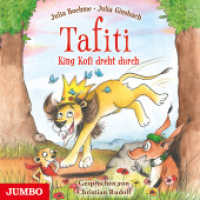- ホーム
- > 洋書
- > 英文書
- > History / World
Full Description
Historical Mechanisms argues that scientific method can provide key new insights about events that took place long ago. Taking a fresh approach to historical method and theory, this book contends that there is enough data to show that under certain circumstances societies have behaved, and will continue to behave, in similar ways throughout history.
In this book, Andreas D. Boldt discusses the possibility of utilizing natural scientific theories in order to explain historical processes, focusing on the question of how nations and empires rise, succeed, fail and then assume another form in which they begin the cycle again. Scientific methods are utilized metaphorically as a means of establishing connections between events and trends throughout history, and this book argues that these methods can explain historical patterns such as chaos and stability, the relationship between power centres and power vacuums, the necessary conditions for the expansion of empires and the influence of natural and man-made borders.
Exploring the ways in which concepts from science can be employed to shed new light on the analysis of historical data, Historical Mechanisms is valuable reading for all scholars of the theory and method of history.
Contents
Acknowledgements
Introduction
Chapter 1: `Historical Mechanisms' - Describing the new method
Chapter 2: How to use `Historical Mechanisms' to analyse the rise and fall of states and empires
Chaos in history
The relationship of horizontal and vertical power
The relationship of the centre of power and the power vacuum
Forms of expansion
The importance of quantity and quality
Borders and the centre
Memory, education and the role of languages for modern nationalism
The role of terrorism and propaganda control in times of struggle
Chapter 3: Auxiliary information: The ideas of Machiavelli and geography
Chapter 4: Case studies: Applying the new method to history
Germany: Three Empires and a democratic nation state
Russia: From Tsarist/Soviet Empire to Putin's Russia
Turkey: From Ottoman Empire to Turkish Republic
China: Imperial-national continuities of unity and quantitative growth
India: Greater British-India and its successor states
USA: Pax Americana and Imperium Americanum
England: Rise from the periphery to the British Empire and return to its peripheral state
Brazil: From a colony to empire
France: A history of royal, imperial and republican empires
Greece: Greatness lies in Ancient History and the constant try of the renewal of the Hellenistic Empire
Iraq: The road from most powerful empires in history to complete peripheral power-vacuum
European Union: A power case based on economic interests
Conclusion: The importance of integrating natural scientific aspects of history
Appendix
Bibliography
Index








